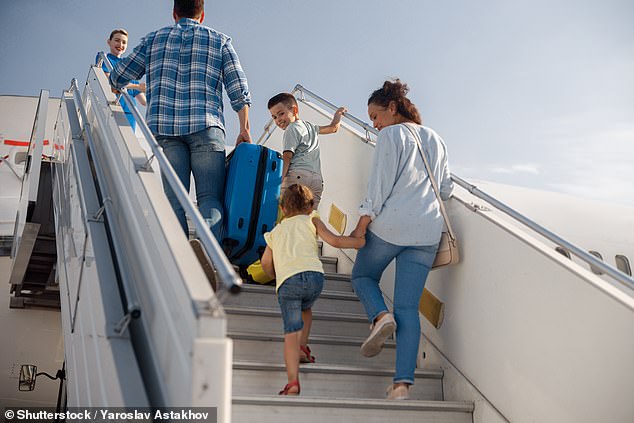[ad_1]
British travellers are being warned to double-check their vaccinations are in order at least six weeks before jetting off on holiday.
According to the NHS, holidaymakers are advised to make an appointment with their GP or at a private travel clinic at least six to eight weeks before their departure date.
Forward planning is especially important as certain jabs must be administered well in advance to allow the body to build immunity against viruses and disease abroad.
Health experts from the UK Health Security Agency (UKHSA) also urge travellers to research their destination and check whether preventative measures, such as vaccines, are required.
They can also use the TravelHealthPro website, supported by UKHSA, which offers country-specific advice, including active health risks, vaccine recommendations and information on maintaining peak health abroad.
The UKHSA says: ‘Ideally travellers should consult their GP, practice nurse, pharmacist, or travel clinic at least four to six weeks before their trip for individual advice, travel vaccines and malaria prevention tablets, if relevant for their destination.’
In addition, both adults and children are advised to be up to date with their routine NHS vaccinations – including MMR (measles, mumps, and rubella), polio, meningitis, hepatitis and tetanus – as these infections can be more prevalent in some countries.
For holidaymakers travelling to a malaria risk area, they’re encouraged to consult with their GP about appropriate malaria prevention measures, including antimalarial tablets.

British travellers are encouraged to double-check their vaccinations are in order at least six weeks before jetting off on holiday
Depending on the destination and activities planned, travellers may also need additional vaccines for typhoid, hepatitis A, Japanese encephalitis, rabies, or yellow fever.
A report published by the UKHSA indicates a rise in travel-associated enteric fever cases in England, Wales and Northern Ireland in recent years.
A total of 702 instances of cases – including typhoid and paratyphoid infections – were reported in 2024, an per cent increase from 645 cases in 2023.
Both typhoid and paratyphoid infections are preventable illnesses transmitted through contaminated food or water, and the majority of cases caught during travel to regions with poor sanitation.
Brits heading abroad can A free free typhoid vaccination is available at local GP surgeries for British travellers heading abroad, but there are no existing jabs paratyphoid.
It comes as a health alert has been issued for British tourists travelling to a popular European destination this summer as two potentially fatal diseases have been detected.
In Italy, health authorities have reported the first locally acquired cases of both dengue and chikungunya, mosquito-borne viruses that are typically found in tropical regions like South America and India.
Both were previously considered primarily imported diseases, found in individuals who had contracted them abroad.

Forward planning is especially important as certain jabs must be administered well in advance to allow the body to build immunity against viruses and disease abroad
However, the two new cases indicate that the viruses were caught within the country, according to the Foreign Office-backed Travel Health Pro.
Dengue fever cases have seen a significant rise globally, reaching a record high in 2024 with over 14 million reported cases, according to the European Centre for Disease Prevention and Control.
In June of this year, Australian holidaymakers were issued a warning after the Cook Islands, a nation in the South Pacific, declared the most recent outbreak of the disease after 19 cases, including two active cases, were recorded.
Case counts have also been increasing in Samoa, Tonga, French Polynesia, Fiji and Kiribati.
[ad_2]
This article was originally published by a www.dailymail.co.uk . Read the Original article here. .

